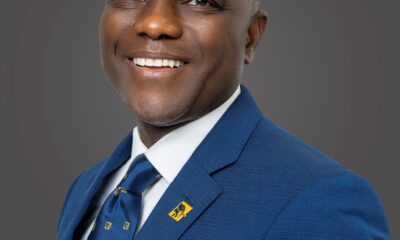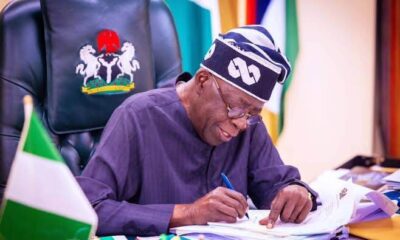News
FORGERY: Governor Obaseki In Trouble As Court Orders APC To Open Fresh Suit
FORGERY: Governor Obaseki In Trouble As Court Orders APC To Open Fresh Suit
It appears Governor Obaseki has landed in another trouble as forgery case against him has taken a new twist.
CityNews Nigeria reports that the Abuja division of the Federal High Court on Wednesday ordered the All Progressive Congress (APC) to open its case against Edo State Governor. Godwin Obaseki in the alleged certificate forgery suit.
This was after the court refused to stay proceedings in the suit as requested by the Governor.
Justice Ahmed Mohammed in his ruling said the court will comply with the order of the Court of Appeal directing the court to continue with the trial on day to day basis.
The judge observed that his court will continue with the trial as directed by the Court of Appeal until the order is set aside.
Justice Mohammed noted that his court must obey the hierarchy of courts in line with the provisions of the law.
He held that given the order of the Court of Appeal and the nature of the case, the Christmas vacation is not enough ground to stay proceedings.
Accordingly, the court directed the plaintiff to open and close his case within two days beginning from Thursday, December 24 to Tuesday, December 29.
It equally gave the defendants two days to open and conclude their defence effective from Wednesday 30 to Thursday 31 of December 2020.
Earlier, counsel to the plaintiff, Chief Akin Olujimi, SAN, had informed the court about the ruling of the Court of Appeal on December 16, 2020, directing the trial court to proceed with the trial after dismissing the application for stay of execution brought by the governor, Godwin Obaseki.
He urged the court to proceed with the trial in compliance with the ruling of the Abuja division of the Court of Appeal.
But in opposition, counsel to the governor Obaseki, Ken Mozia, SAN, urged the court not to proceed with the trial as his client has entered an appeal at the Supreme Court against the decision of the Court of Appeal, including an application to stay further proceedings on the matter.
He urged the court in the circumstances, to tarry a while and await the decision of the Supreme Court on the appeal.
‘My lord, the first defendant not satisfied with the decision of the Court of Appeal, has filed an appeal against the ruling and the consequential orders to the Supreme Court, which is the final court,’ he said.
‘The notice of appeal has been duly served on the parties in this case. Also, the record of appeal from the Court of Appeal has been duly transmitted to the Supreme Court, where it has been entered as appeal No: SC/C6/989/2020, and copies of the notice of appeal, the application for stay and other reliefs earlier mentioned are all exhibited in an affidavit deposed to by Abraham Olajide.
‘Also exhibited are the enrolled orders to appeals nos: CA/B/128/2020 and CA/B/128a/2020, the Court of Appeal Benin after delivering judgment directed the state High Court to continue with proceedings in suit No. FHC/B/CS/48/2020, between Kenneth Asekomeh and Another V All Progressive Congress (APC), and 3 others, where despite that order, the counsel to the defendant still filed an appeal at the Supreme Court and followed it up to the Federal High Court with an application for stay of proceedings and insisted that the Federal High Court await the determination of the appeal at the Supreme Court.
‘The Federal High Court acceded to that request, they cannot honestly ask this court to proceed having posited that the Federal High Court must wait, they have a duty to continue to maintain that position to say that the Federal High Court is obliged to await the determination of the appeal before the Supreme Court.’
He argued that once a party has taken steps to contest a decision of Court of Appeal by way of a further appeal to the Supreme Court and follows it up with an application for stay of proceedings, the judgment of the Court of Appeal will not be treated as final until the steps taken are completely resolved.
The second leg of his argument was predicated on the fact that the trial cannot be conducted during the Christmas vacation as contained in a circular issued by the Chief Judge of the Federal High Court.
The said circular dated December 18, titled, “Notification of Federal High Court Christmas Vacation for 2020”, stipulated that only matters bordering on national interest, human rights-related issues and release of vessels shall be entertained during the vacation which begins on Tuesday, December 22 and ends on Friday, January 8, 2021.
The lawyer noted that by the said notification, the vacation Judge for the Abuja division of the Federal High Court is Justice Evelyn Maha.
‘Today, being within the period declared for Christmas vacation and this case not being one of the cases listed as those that can be entertained by vacation Judge, including the fact that your lordship is not a vacation judge, the court cannot exercise any jurisdiction on the matter.’
He argued that whether the matter is urgent or not is determinable by the facts contained in affidavit evidence led before the court adding that nothing short of that will suffice.
‘There is manifest non compliance in this case such that the court is not even in a position to contemplate whether this case is urgent or not by law.’
Mozia informed that the defence team has withheld their consent for any proceedings to be done during the Christmas vacation period.
The counsel to the People’s Democratic Party (PDP), Isilalomhe Razak, aligned himself with the argument canvassed by counsel to Obaseki in urging the court to suspend proceedings and await the outcome of the appeal before the Supreme Court.
But responding, the counsel to the plaintiff, Olujimi, urged the court to discountenance the submissions of the defence team and proceed with the trial in compliance with the ruling and directive of the Court of Appeal.
While noting that the matter is time-bound, Olujimi argued that section 285 (a) of the 1999 Constitution (4th Alteration Act) is a compelling provision that proceedings at the trial court should not be stayed based on preliminary and interlocutory issues.
‘The compelling provisions of section 285 (a) is to the effect that where a preliminary or interlocutory issue is raised, the court shall suspend it’s ruling and deliver it at the stage of final judgment.
‘Secondly, the first and second defendants failed to appreciate that the Chief Judge of the Federal High Court has since July 24, 2020, settled the issue of hearing of all categories of pre-election matters in the Practice Direction number two issued by the Chief Judge.
‘What the Chief Judge issued in July was a Practice Direction which is legislation issued by him to regulate pre- election trials.’
He submitted that the said Practice Direction mandates a Judge to hear a pre-election matter pending before his court until judgment is delivered.
‘The Chief Judge did not say the practise direction applies only to annual vacation but includes all manner of vacation in general. A circular is not a rule of court. It is not legislation or law unlike the practice direction,’ Olujimi argued.
He argued further that paragraph two of the practice direction stated that nothing in the Federal High Court shall prevent the hearing of a pre-election matter to judgment.
He submitted that the position of the law, as settled by the Supreme Court is that where time is of the essence in a case before the court, there shall be no stay of proceedings pending appeal.
‘What the defendants are asking the court to do is to go against the directive of the Court of Appeal, which has not been set aside. I urged the court to decline such an invitation.’
The APC, in the suit marked FHC/B/CS/74/2020, prayed the court for an order disqualifying Obaseki from contesting the September 19 governorship election in Edo State on the grounds that he supplied false information on oath to INEC, an act said to be contrary to Section 31(5) and (6) of the Electoral Act, 2010.
The party accused the governor of forging his university certificate presented to INEC in aid of his qualification for the governorship election in Edo State.
The APC also claimed that there are discrepancies in the subject Obaseki claimed he passed in his West African Examinations Council (WAEC) exam.
The governor won the September 19 governorship election in Edo to secure a second term in office.


















